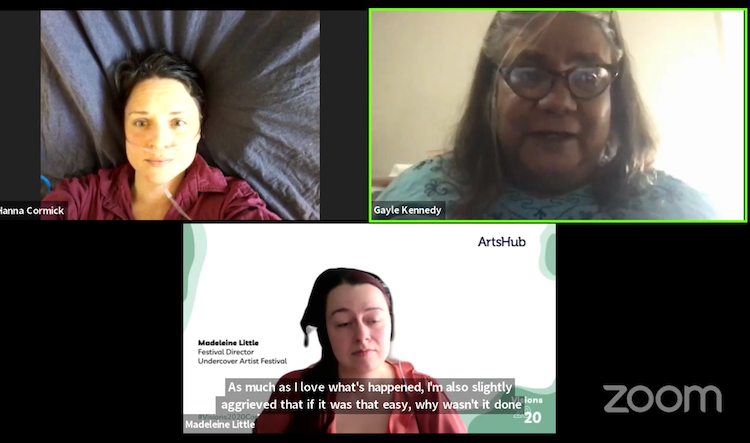‘Digital access and access in general is not just a consideration, it’s actually an integral, immovable part of daily life,’ said performer, theatre maker, and access consultant Madeleine Little putting disability at the centre of the panel Post-pivot digital and access at ArtsHUb’s Visions 2020 conference.
Hosted by performance artist and disability activist Hanna Cormick, all three speakers including First Nations author/editor Gayle Kennedy and festival director Madeleine Little live with some form of disability and had lived experience of how the introduction of digital events had changed their arts practice.
ACCESS IS ATTITUDINAL
Kennedy was positive overall and said, ‘Digital access has been, I think, a boon for people with disabilities, particularly those of us that have to spend a lot of time bedridden because of fatigue or various other ailments.’
However, she pointed out that ‘This year, because it suited able‑bodied people, how quickly it [digital access] was installed and up and operating was mind blowing.’
From virtual conferences to Broadway shows, events that had been completely inaccessible before the pandemic were suddenly available. The panel agreed that it showed that the barriers to further access before 2020 were in fact ‘attitudinal’.
‘As much as I love what’s happened, I’m also slightly aggrieved that if it was that easy, why wasn’t it done before?’ Little observed.
‘A COMMUNITY WHERE WE CAN ALL PARTICIPATE’
The quick access to digital events showed how easy inclusion can be, both online and offline.
Kennedy emphasised that it was time to make live events such as festivals and theatres fully accessible. ‘Let’s have a community where we can all participate,’ she said.
‘I want to see more people with disabilities. I want to see programs in braille. I want to see captioning for deaf people, also signers where possible. I want to see people from different cultural groups in there. What are we doing that’s wrong? Why don’t these people feel comfortable attending the theatre?
‘The arts sector really needs to start asking themselves the hard questions,’ Kennedy said.
Read: A rallying cry for the future at Visions 2020
Responding to Kennedy, Little added, ‘The thing that kept coming to my mind is that art should really be for everyone – for everyone to consume, for everyone to make.’
Little said: ‘Now that we know that these tools are available to us, not using these tools is making an active decision to say that these communities of people aren’t welcome in these spaces, and they’re not welcome to consume art, they’re not welcome to create art.’
She emphasised that ‘Arts organisations need to continue using digital access outcomes for art.’

Post-pivot digital and access panel, Visions 2020. Top L-R Hanna Cormick, Gayle Kennedy and Madeleine Little.
NO TURNING BACK
‘We just need to accept we can’t go back to the way things were. That’s not going to happen. It’s not going to work. What do we need to do to get to a place of equitable access and opportunities for everyone,’ Little said.
Process transparency, and finding the right consultants with appropriate lived experience and qualifications to inform best practice guidelines for your organisation was Little’s advice.
‘Ultimately, if you’re transparent about what you want to do and you’re committed to actual diversity, [then] make connections with the local disability arts organisations and advocacy bodies,’ Little said.
Acknowledging the panel, and the great emotional labour advocacy work takes, Little added, ‘Digital access and access in general is not just a consideration, it’s actually an integral, immovable part of daily life.’
‘The arts sector really needs to start asking themselves the hard questions.’
– Gayle Kennedy
Panel host Cormick added: ‘I think it’s very useful to remind people about that concept of transparency of process because this is a learning curve for everyone, even for those of us within the disability community.
‘We’re not each individual experts on all types of access. We might know of our own access needs but not about other people’s so we’re still learning as well,’ Cormick said.
A question from the virtual audience on programming and leadership opened up the discussion further.
Little responded, ‘I think my gut response says you can’t be what you can’t see. So having leaders that you can relate to and can safely confide in because they have very similar backgrounds to you is a crucial component to improving diversity in the arts.’
In conclusion Little said, ‘I know a lot of people might feel that entering the world of access in art is scary or they don’t want to get it wrong.’
She continued, ‘But honestly, if your heart is in the right place and you’re doing the best you can and transparent with the process, things will work out and you will get that wider audience base as well. Don’t forget art is for everyone.’
Videos of Visions 2020 panel discussions will be available to attendees soon.





